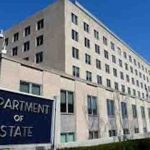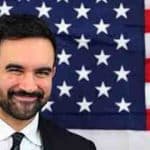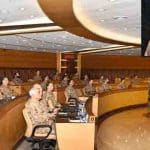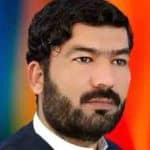UNITED NATIONS, Dec 04 : Amid a rising tide of anti-Muslim hate, Pakistan has renewed its call for an “action plan” to tackle the pressing issue of Islamophobia.
Speaking at a side-event of the 10th Global Forum of the U.N. Alliance of Civilizations (UNAOC) recently held in Cascais, Portugal, Additional Foreign Secretary, Imran Ahmed Siddiqui, reaffirmed Pakistan’s “unwavering commitment” to combating this scourage, according to a press release issued in NewYork on Tuesday.
At the same time, he reiterated Pakistan’s deep concern over the continued rise of Islamophobia, as manifested in the continued desecration of religious symbols, demolition of mosques and other Islamic religious and heritage sites, hate speech and disturbing attacks on Muslims, “particularly in the territories under foreign occupation”.
The UN Alliance of Civilizations was established in 2005 to galvanize international action against extremism through fostering of international, intercultural and interreligious dialogue and cooperation.
The Alliance benefits from a political support of the Group of Friends, a community of countries and international organizations which actively promotes its objectives and work at the global, regional and local levels, as well as worldwide. The Group is a driving force of UNAOC and plays a vital role in its strategic planning and implementation process.
The group currently includes 153 members, with 124 UN member states, 1 non-member state, and 28 international organizations, representing all continents, societies and cultures.
In his remarks, Imran Siddiqui said commended the Alliance’s contributions over the past two decades in fostering dialogue and mutual respect among religions.
As regards Islamophobia, he cited Pakistan’s leadership in tabling two General Assembly resolutions on behalf of the OIC on the subject, with the most recent resolution, adopted in March 2024, calling for the appointment of a UN Special Envoy on Islamophobia.
A Global Conference on safeguarding religious sites was also held on the margins of the Forum, where Pakistan highlighted the alarming trend of deliberate attacks on mosques, often carried out with impunity and state sanction, the press release said. In this regard, Pakistan urged the UNAOC to prioritize the protection of mosques and other Islamic religious and heritage sites that are at immediate risk of destruction in the mapping of religious sites under the 2019 Action Plan for safeguarding of the religious site.
Meanwhile, world leaders attending the forum adopted a bold, forward-looking declaration to advance peace as war rages on, from Gaza and Lebanon to Sudan and Ukraine.
Harnessing the power of artificial intelligence (AI) and combatting hate speech and mis- and disinformation are part of the plan to bolster peace and mutual understanding as Heads of State and Government, including kings, presidents and prime ministers from Cabo Verde, Senegal and Spain, unanimously adopted the Cascais Declaration.
Named for the city hosting the UN Alliance for Civilizations 10th Global Forum from 25 to 27 November, the declaration outlines a range of actions and focuses on solutions to a current landscape of eroding trust and rising antisemitism, nationalism and online hate.
“These are very difficult times,” said UN Secretary-General Antonio Guterres at the forum’s opening session. “In such a scenario, we need peace” now, in Gaza, Lebanon, Sudan and Ukraine and beyond.
The adoption of the declaration is the centre-piece of the 10th Global Forum, which included a dynamic youth forum and film festival on Monday, its Intercultural Innovation Hub ceremony on Tuesday and vibrant panels throughout, tackling current challenges, from a spike in antisemitism to the power of young people.
“We need voices and actions across all levels,” including in communities, online and across cultures and institutions, using all tools available, Guterres said.
The 25-paragraph declaration spotlighted a set of innovative actions and keys to unleashing this badly needed peace. It noted the potential use of AI as a tool to advance intercultural and inter-religious dialogue and stressed the importance of combatting disinformation, misinformation and hate speech while strengthening information integrity.
The Cascais Declaration also stressed the importance of intergenerational dialogue for peace, sustainable development and human rights; noted the contribution of “sports diplomacy” as a tool for promoting dialogue and emphasized the need to support and strengthen the role of women as negotiators, mediators and peacemakers.
By its provisions, world leaders and partners pledged to:
— Emphasise the need to combat all forms of religious intolerance;
— Acknowledge the central role of inclusive, quality and transformative education in promoting dialogue, peace and human rights;
— Recognise the role that religious leaders can play in conflict mediation and development cooperation;
— Underline the positive impact that safe, orderly and regular migration can have on countries of origin and destination, including through promoting cultural pluralism and encourage the creative vision of young people to prevent xenophobia and highlight positive narratives about cultural diversity, social inclusion and mobility, and,
— Take note of the adoption of the Pact for the Future, which recognizes the role of reinvigorated multilateralism and the importance of the voice of religious leaders and faith-based organizations in promoting a culture of peace
Ahead of the declaration’s adoption, the UN chief and world leaders took the floor, including Prime Minister Aminata Touré of Senegal, who drew attention to the ongoing devastating war in Gaza.
“As we witness what is happening in Gaza, with more than 42,000 victims, mostly civilians, what does civilization mean in such context?” she asked. “Is civilization about ‘you kill one of mine, I’ll kill 34.16 of yours,’ which is, so far, the retaliation rate of Israel against the unacceptable, widely condemned attacks of October 2023. Don’t the unbearable scenes we see on television make any discussion on civilization look out of touch?”
She said there is no other way to deal with civilization than discussion based on equal rights embedded in the UN Charter and international framework.
King Don Felipe VI of Spain told delegates that “in the 21st century, diplomacy is a tool of peace, but its traditional tools are outdated and must be supplemented with new spheres of action, more boldness, creativity and pragmatism.”
“We must raise our vision to more deeply understand what unites us,” King Don Felipe VI said. “The Alliance of Civilizations is the implementation of what is known as the diplomacy of values, tearing down walls and building bridges,” he added. “Our actions must go beyond conference rooms, to school, places where people gather and the marketplace.”
In this regard, he said, social media is potential as a catalyst in this regard, he said, pointing to the Alliance’s Youth Solidarity Fund, which was featured on day one of the 10th Global Forum.
Still, a great deal more needs to be done, he said. At a time when dehumanisation is a growing problem, he emphasised that efforts must aim at eliminating stereotypes and ensuring that the wealth of human diversity is beneficial for everyone.
In a similar vein, UN Secretary-General Guterres said that the absence of peace is leading to an erosion of trust, making the Alliance of Civilizations’s work more important than ever before.
“Rebuilding trust is our essential task,” he said.
“Hate-filled frenzies are perpetuating stereotypes and misconceptions,” the UN chief said. Unchecked digital platforms and AI have endowed hate speech with a speed and reach unseen before. We must rein in hate speech and disinformation spreading online.”
The Alliance’s High Representative Miguel Ángel Moratinos renewed a call for an alliance for peace to put an end to violence and extremism and wars in the 21st century.
“Biodiversity needs to be protected, but what about human diversity?” he asked.
“We need to make peace with nature, and we need to make peace with ourselves,” he said, emphasizing that the Alliance is the best platform to do so.
Follow the PNI Facebook page for the latest news and updates.









